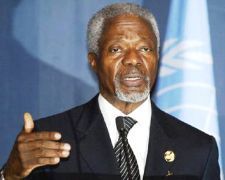Annan awaiting Sudan clarification on AU-UN force for Darfur
Nov 22, 2006 (UNITED NATIONS) — UN chief Kofi Annan said that he was waiting for Khartoum to clarify contentious points of a tentative deal for a peacekeeping force in Darfur amid fears the conflict there could spiral out of control.
 Annan, who is to step down at the end of December after 10 years in office, briefed the Security Council on the high-level talks he attended in Addis Ababa last week and which yielded agreement on a UN-African Union (African Union) force for Darfur subject to Sudanese clarifications.
Annan, who is to step down at the end of December after 10 years in office, briefed the Security Council on the high-level talks he attended in Addis Ababa last week and which yielded agreement on a UN-African Union (African Union) force for Darfur subject to Sudanese clarifications.
“I spoke to (Sudanese) President (Omar) al-Beshir today and he has indicated he will be writing to me shortly,” Annan told reporters at the end of the closed-door council consultations. “I think I should wait for his letter.”
Annan is seeking clarifications from Beshir on the size of the force — which the UN foresees at 17,000 troops and 3,000 police — how the force commander should be appointed and the role of the special representative who would report to both the UN and the AU, Annan said.
The Addis Ababa deal came after Sudan resisted intense international pressure to accept a robust UN force to replace the ill-equipped AU contingent in Darfur. But Khartoum has also denied agreeing to the “hybrid” formula.
Annan said in Geneva Tuesday that he expected a Sudanese response by Wednesday at the latest, ahead of the meeting of the AU’s peace and security council scheduled for November 24 in Brazzaville.
But that meeting at head of state level has now been rescheduled for November 29 in Abuja, Nigeria, where African leaders will discuss whether to extend the mandate of the cash-strapped AU force in Darfur beyond December 31 as well as its funding.
The UN chief also told the 15-member council that the Addis Ababa deal provides for “a stronger, more capable, better financed peacekeeping operation, benefitting from the best of AMIS (the AU force) and the value that can be brought to bear by the United Nations.”
“This value could include funding, unified AU-UN leadership, day-to-day support and guidance from the (UN) department of peacekeeping operations (DPKO) and the ability of DPKO to identify and deploy capabilities and troops which may not be available among AU member states,” he added.
In a related development, Annan met Wednesday with his designated successor, South Korea’s former foreign minister Ban Ki-Moon, who expressed his “deepest respect and admiration for what you (Annan) did for Darfur.”
Meanwhile UN emergency relief coordinator Jan Egeland earlier Wednesday warned the Security Council that the Darfur conflict could spin out of control.
He urged “an immediate stop to all attacks, the cessation of hostilities and respect for the ceasefire by all parties, before an entire generation of young men is enlisted in the fighting.”
“Government forces, militias, a plethora of rebel groups and an increasing number of Chadian armed opposition groups roam around freely inside and outside the camps, spreading terror and fear,” said Egeland, who is to step down from his post shortly.
“New displacement is fueled by cross-border raids of armed groups who receive arms and safe havens on both sides of the Chad-Sudan border, thereby rapidly pushing the conflict toward a regional escalation,” he added.
He said that large parts of Darfur were witnessing “a meltdown of law and order” in an atmosphere of “total impunity.”
The war in Darfur erupted in February 2003 when rebels from minority tribes took up arms to demand an equal share of national resources, prompting a heavy-handed crackdown from the government forces and a proxy militia called the Janjaweed.
The conflict left 200,000 people dead and displaced 2.5 million more, according to UN figures. Some sources give much higher figures.
(AFP)
